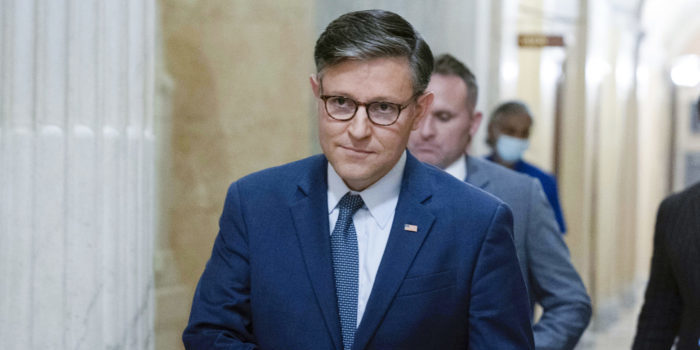(Headline USA) The House on Wednesday night rejected a bill to fund federal government for six months that was packaged alongside election-integrity measures such as proof-of-citizenship requirements.
The bill failed after 14 Republicans joined Democrats to reject it—including some who stood on principal in opposition to any short-term funding extensions.
Speaker Mike Johnson, R-La., now has until Sept. 30 to rally Republicans in order to avert a shutdown, or at least one for which the GOP would bear the brunt of the blame.
Johnson pulled the bill from consideration last week because it lacked the votes to pass. He said then he would work over the weekend to build consensus within the Republican ranks.
Democrats overwhelmingly opposed the SAVE Act, sponsored by Rep. Chip Roy, R-Texas, which would require new voters to provide proof of citizenship—a leading election-year priority for Republicans amid concerns that the millions of illegal immigrants allowed in under the Biden administration will seek to disrupt the political balance by voting illegally.
Even if a tiny percentage of noncitizens vote, it could determine the outcome of an extremely close race. Johnson noted that Republican Rep. Mariannette Miller–Meeks, R-Iowa, won her seat back in 2020 by six votes.
“It’s very, very serious stuff and that’s why we’re going to do the right thing,” Johnson said. “We’re going to responsibly fund the government, and we’re going to stop noncitizens voting in elections.”
Meanwhile, Republican presidential nominee Donald Trump weighed in just hours before the vote, seemingly encouraging House Republicans to let a partial government shutdown begin at the end of the month unless the SAVE Act is included in the continuing resolution bill.
“If Republicans don’t get the SAVE Act, and every ounce of it, they should not agree to a Continuing Resolution in any way, shape, or form,” Trump said on the social media platform Truth Social.
Johnson told reporters prior to the vote that he was not ready to discuss an alternative plan to keep the government funded.
“Let’s see what happens with the bill, all right. We’re on the field in the middle of the game. The quarterback is calling the play. We’re going to run the play,” Johnson said.
House Democrats said the proof-of-citizenship mandate should not be part of the continuing resolution to keep the government funded and urged Johnson to work with them on a bill that can pass both chambers.
“This is not going to become law,” said Rep. Pete Aguilar, D-Calif. “This is Republican theatrics that are meant to appease the most extreme members of their conference, to show them that they are working on something and that they’re continuing to support the former president of the United States in his bid to demonize immigrants.”
Lawmakers were not close to completing work on the dozen annual appropriations bills that will fund the agencies during the next fiscal year, so they’ll need to approve a stopgap measure to prevent a partial shutdown when the new fiscal year begins Oct. 1.
Senate Majority Leader Chuck Schumer, D-N.Y., said the only way to prevent a government shutdown was for both sides to work together on an agreement. He said the House vote announced by Johnson was doomed to fail.
“The only thing that will accomplish is make clear that he’s running into a dead end,” Schumer said. “We must have a bipartisan plan instead.”
The legislation would have funded agencies generally at current levels while lawmakers work out their differences on a full-year spending agreement.
Democrats, and some Republicans, were pushing for a short extension. A temporary fix would allow the current Congress to hammer out a final bill after the election and get it to Democratic President Joe Biden’s desk for his signature.
But Johnson and some of the more conservative members of his conference were pushing for a six-month extension in the hopes that Republican nominee Donald Trump will win the election and give them more leverage when crafting the full-year bill.
Senate Republican leader Mitch McConnell of Kentucky declined to weigh in on how long to extend funding. He said Schumer and Johnson, ultimately, will have to work out a final agreement that can pass both chambers.
“The one thing you cannot have is a government shutdown,” McConnell said. “It would be politically beyond stupid for us to do that right before the election because certainly we would get the blame.”
Regardless of the vote’s failure, Republican lawmakers sought to allay any concerns there would be a shutdown at the end of the month. Rep. Mike Lawler, R-N.Y., said another stopgap bill should be voted on that would allow lawmakers to come back to Washington after the election and finish the appropriations work.
“The bottom line is we’re not shutting the government down,” Lawler said.
The House approved a bill with the proof of citizenship mandate back in July. Some Republicans who view the issue as popular with their constituents have been pushing for another chance to show their support for the measure.
Adapted from reporting by the Associated Press

